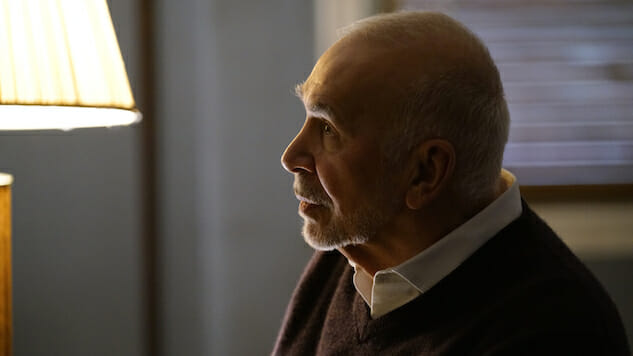
Benjamin Stobert (Brett Tucker), of the muscular frame and earnest grin, turns out to be full of surprises—not least the persistent, playful optimism with which he scratches through Elizabeth Jennings’ (Keri Russell) hardened shell. Teaching her tai chi in his boxer shorts, as she mimics his movements in a long, white tee, the trait she first read as arrogance seems, more and more, to be the sort of idealism Elizabeth herself once possessed. As early as Season Three’s “Born Again,” in which Elizabeth wistfully describes her involvement in the civil rights movement to Paige (Holly Taylor), her sense of purpose has begun to slip, tangled up in the wanton cruelties her career requires; in tonight’s episode, “Crossbreed,” the solace she finds in the age-old Chinese movements is fleeting, buffeted by the needless death of the lab technician in “The Midges” and memories of her friendship with Young Hee. The result, as Benjamin perceives, is a reservoir of inner turmoil that even Elizabeth’s steely exterior can’t hide, and his diagnosis, “heart heat,” is the season’s primary motor: It’s the pinched feeling, the tamped-down terror, that feeds the beast of doubt.
Though the The Americans has, of late, turned its focus away from religious faith—it crops up in “Crossbreed” as Paige, reading Marx, works through the disconnect between Capital’s criticism of religion and the positive feelings that suffused her baptism—the series treats other systems of belief in similar fashion. Communism, capitalism, democracy, psychology, EST: Each functions, in its own way, as a set of principles the characters test against the facts of their daily lives, and each fails, in the long run, to temper the heart, for there is no single solution to the problem of meaning that The Americans continues to face. Philip (Matthew Rhys), long suspected of dangerous political sympathies by his KGB handlers, wonders at the riches he’s found in enemy territory (“We didn’t have anything, and now we have everything”), and glosses his commitment to the USSR as if it were a 9-to-5; Elizabeth, never one for quick fixes, finds unexpected calm in tai chi and talk therapy, before returning to the notion that, under Soviet communism, everyone is “in it together.” But in searching for forms of faith to soothe their “heart heat,” to heal their trauma, Philip, Elizabeth and Paige don’t act as adherents to one or another catechism. Rather, they choose what seems to work and dispense with the rest: On the ground, no ideology operates as proffered on paper, subject to the constant reinterpretation and hybridization to which the title of “Crossbreed” refers.
This is difficult material to cover in the course of an hour, and as such, the episode strains to keep its plates spinning. Mischa (Alex Ozerov) returns home and Gabriel (Frank Langella) prepares to do so himself; the appearance of a Mary Kay saleswoman at the Jennings’ doorstep sends Elizabeth into regretful remembrances of Young Hee; Oleg (Costa Ronin) digs deeper into widespread corruption in the Soviet food system as he submits, at his mother’s advice, to the CIA’s pressure. Compared to “Lotus 1-2-3,” “Crossbreed” lacks the thematic coherence, or indeed the wrenching emotion, to hold its fragmented narrative together, though perhaps this is the foremost indication of where we are: With external threats (Pastor Tim, Matthew Beeman, Martha) to the Jennings family now in abeyance, The Americans offers rueful acknowledgement that it’s their own doubts, their divided selves, that might cause it all to fall apart. (As an aside, I wonder if the reintroduction of Keidrich Sellati’s oft-forgotten Henry spells trouble: He holds Stan, played by Noah Emmerich, in closer confidence than his parents, and appears increasingly frustrated by their lack of attention.)
Identifiable only by redness at the tip of the tongue, “heart heat” is hard to visualize, and thereby to dramatize, and “Crossbreed” marks the season’s first stumble—this being a relative assessment, of course, for even in one of its weaker episodes, The Americans unearths its share of sublime moments. In learning that his father was not a logger, but a guard at a penal camp, Philip’s pain only deepens, reflecting, in his admission that he knew nothing about his parents, Henry’s own plight; Gabriel’s resignation at his country’s horrific past echoes Philip and Elizabeth’s growing concern that their actions are in the service of principles to which their own government’s commitment is fluid, or feigned.
It’s Gabriel’s description of “difficult times” that most forcefully suggests the slow grind of doubt, the way it gnaws at you, sands you down, crushes you in its awful vise: “He was nobody. We were all nobodies,” he sighs, referring to Philip’s father. “It’s been over for a long time.” I remain stuck on this sentiment, its cold comfort, because it recalls the episode’s most striking sequence, in which Gabriel visits the Lincoln Memorial in the dark of night. Despite its setting, The Americans only rarely relies on Washington’s iconography, and “Crossbreed” underlines its uncommonness with distinct silhouettes and vertiginous camera angles; Gabriel, and his life’s work, seem so insignificant when set against the ship of state, the march of time, the sheer breadth of the conflict he’s spent so long fighting. Dwarfed by the United States’ most just president, peering out at the monument named for its first, Gabriel, nearing the end of his career, appears defeated. Is this a glimpse of his “heart heat,” and of that which awaits Philip and Elizabeth when Marx’s dream of revolution again dies? Is this what it feels like to realize that it’s all been for naught? For all its flaws, “Crossbreed” depicts characters on the precipice of change they can neither predict nor prevent, and in this context, Gabriel’s reflection gathers to it the power of a premonition: We were all nobodies. It’s been over for a long time.
Matt Brennan is the TV editor of Paste Magazine. He tweets about what he’s watching @thefilmgoer.